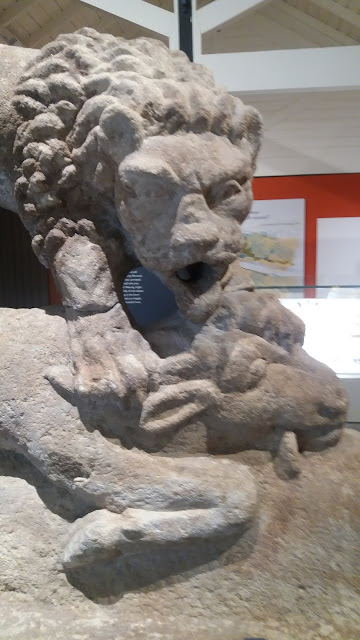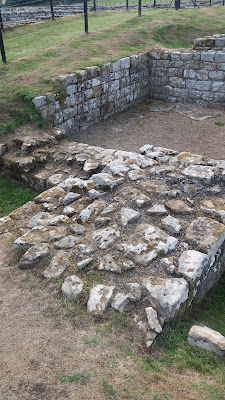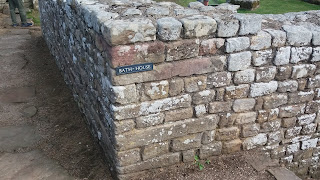After Heddon-on-the-Wall, where we joined in the local pub quiz, but the team with our landlady (the farmer's wife) in won, we walked to Corbridge, which had a Roman camp that was very important, called Corstopitum. I remember the weather was fine and not too hot, and the going was fairly level, and we looked at the wildflowers a lot as our walk went from the ditch to the road and back. A man called Wade had come along and knocked down Hadrian's wall and used it for hard core for his Military Road, which is a fine road if you like roads. The walk went well until the turn off, and there was a small castle and a lovely little church to see, but as we walked past the ford I felt very tired, and of course I was carrying my backpack. I slowed down considerably and found it tough until we got to our B&B at Corbridge, and for some reason we had to walk around the village in the rain that evening, in search of the Roman Camp, but we should have saved it until the morning.
There were some lovely things in the museum, like this good statue of a sheep with a tiny lion, and a relief of a sun god.
There were plenty of drainage channels and so forth in the Roman camp at Corbridge.
On that day we saw the Tyne again, and it was beautiful.
We also went to the even bigger Roman camp at Chesters, and so they blended into one.
We went to the pub for a meal before we went to the farm where we were going to sleep, so we walked until half past eight. But we were in good spirits after a meal.
Then we walked on to Chollerford, where there was a camping barn, and we met with some Americans, father and son, who improved my life considerably by saying they sent on their baggage every night by using a company called Walkers' bags, who performed this wonderful service. That night I couldn't sleep because the bed was so terrible, and it was a bunk room with other people (the Americans) so I felt very embarrassed by my noisy discomfort. I used my phone to read my Kindle book. I felt very cheered by not having to carry anything as we set off the next day. The Amercans told us the walk was going to get tougher, and we would be out in the National park without benefit of tea or toilets.
There were some lovely things in the museum, like this good statue of a sheep with a tiny lion, and a relief of a sun god.
There were plenty of drainage channels and so forth in the Roman camp at Corbridge.
On that day we saw the Tyne again, and it was beautiful.
We also went to the even bigger Roman camp at Chesters, and so they blended into one.
We went to the pub for a meal before we went to the farm where we were going to sleep, so we walked until half past eight. But we were in good spirits after a meal.
Then we walked on to Chollerford, where there was a camping barn, and we met with some Americans, father and son, who improved my life considerably by saying they sent on their baggage every night by using a company called Walkers' bags, who performed this wonderful service. That night I couldn't sleep because the bed was so terrible, and it was a bunk room with other people (the Americans) so I felt very embarrassed by my noisy discomfort. I used my phone to read my Kindle book. I felt very cheered by not having to carry anything as we set off the next day. The Amercans told us the walk was going to get tougher, and we would be out in the National park without benefit of tea or toilets.








No comments:
Post a Comment